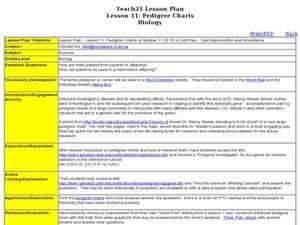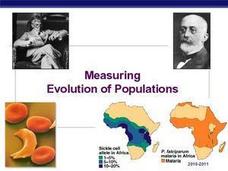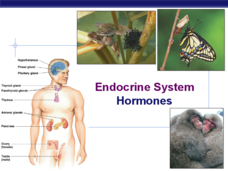Curated OER
Lesson 10: Karyotypes
Students predict traits of future offspring. In this biology lesson, students study karyotyping to predict genetic disorders. They research an assigned karyotype and present information about it.
Curated OER
Pedigree Charts
Students explain how offspring inherit traits from their parents. In this biology lesson, students investigate the genes for nicotine addiction using an interactive website. They construct a fictional pedigree using their chosen...
Curated OER
Fungi
Why did the mushroom go to the party? Because he was a fun guy! Biology learners study fungi while completing this learning exercise. Structure is compared to that of other life forms. The life cycle is displayed with colorful diagrams...
Consortium for Ocean Science Exploration and Engagement (COSEE)
Arctic Smorgasbord
Though the walrus spends roughly one third of its time on land, it eats organisms that live on the bottom of the ocean. The first in a series of five, the lesson uses a variety of plant and animal cards to have scholars build an arctic...
Serendip
Is Yeast Alive?
Through two investigations, life science learners determine whether or not yeast is alive. They perform tests for metabolism by providing sugar and observing if gas is produced as a byproduct. They incubate some of the sample for at...
Virginia Department of Education
Meiosis
Intrigue the class by completing a lesson on meiosis, filled with challenging and insightful activities to spark the interest of every person in the room. Each member of the class learns about genetic disorders due to faulty meiosis, and...
Curated OER
Fantastic Flower
Here is a clever lesson on pollination of flowers for you. In it, learners study the anatomy of a flower, and play a game in which they simulate the process of pollination. This fine plan brings in elements of art, physical education,...
Garden Earth Naturalist Club
Parts of a Flower! Flower Dissection
Sometimes the best way to learn about plants is to see the different parts of a plant yourself. Groups of learners dissect flowers to answer questions about what they observe and what they wonder about their flower.
Curated OER
Classification/Taxonomy/Statistics Review
"Does King Phillip Cry Over Flimsy Grass Stems?" You might not answer that question with this exhaustive worksheet, but your biology class will get the full scoop on the hierarchy of biological classification with this resource. It...
Biology Junction
Plant Diversity
Ginkgo trees existed for more than 350 million years, and, at this time, only one species still remains. While plant diversity generally increases over geologic time, some interesting exceptions occur. Young scientists learn about plant...
Curated OER
Measuring Evolution of Populations
The five agents of evolutionary change are reviewed in this slideshow. Definitions of common terms involved with populations and equilibrium are given, and there are some presentations of Hardy Weinberg equations for common examples of...
University of Minnesota
Sheep Brain Dissection
Bored with frog and earthworm dissections? Had your fill of fetal pigs? Anatomy students will be intrigued by the sheep's brain, and you will be prepared with guiding questions, extension activities, and pictures as they dissect one —...
Curated OER
Human Cloning: Is it Biological Plagiarism?
Is cloning good or harmful? Help your class understand the risks and benefits as they read, research, and discuss human cloning. Individuals form teams, research information, and present to the class before concluding with an in-depth...
Curated OER
Mitosis Cookies Activity
Reward biology learners for working hard in their mitosis lesson with a sweet snack at the end! They begin by twisting apart creme-filled cookies and using the icing as a cytoplasm. Colored candy sprinkles make up chromosome pairs,...
Curated OER
Kingdom: Fungi
The general characteristics that affect classification of fungi and other organisms in the domain Eukarya are detailed for the students on 12 attractive slides. Teachers can access individual slides to cover life cycles or...
Curated OER
Endocrine System: Hormones
Almost a duplicate of another slideshow on our site, these slides covering classes of hormones and their function, have gaps prepared for your pupils to fill in. This copy could be printed out for your class to complete as notes during...
Curated OER
Endocrine Review Sheet
Starting with a diagram of the kidneys and urinary tract of the human, this sheet has questions about excretion, blood concentrations of hormones, gland feedback mechanisms and the effects of some hormones.
Curated OER
Animal Nutrition, Variations, Adaptations & Regulation
Information about digestion of various food components is given in this PowerPoint. The diets of herbivores and carnivores are compared, and there are many diagrams giving details of their digestive system specializations. The...
Virginia Department of Education
Animal Phyla and Plant Divisions
Searched hours for an activity that allows individuals the ability to use multiple resources to learn about both plant and animal kingdoms? This discussion and activity provide pupils with the ability to visualize each organism...
Curated OER
LP 6--8: Xenopus laevis (frog) Development for a 7th Grade Audience
Seventh graders view lab stations with Xenopus at different stages of development. They identify the life stage of the sample, as well as the previous and next stages. Students must explain their reason for selecting the specific stage.
Curated OER
Fungi
Lovely pictures help to summarize the different characteristics of fungi in this PowerPoint which covers structure, function and the way that fungi get nutrients. Symbiotic relationships are examined, and some commercial uses are...
Curated OER
Control of Prokaryotic (Bacterial) Genes
A nicely formatted set of slides that logically follow and define the structure and function of the genes in Bacteria. The repressor proteins and other gene regulators are listed and diagrams support the explanations of their function on...
Curated OER
Fungi
The general characteristics that affect the classification of fungi and other organisms in the domain Eukarya are detailed on 12 attractive slides. Teachers can access individual slides to cover life cycles or diversity, or can use the...
Polar Trec
Arctic Smorgasbord!
Two blooms of phytoplankton, instead of just one, now occur in the Arctic due to declining sea ice, which will have widespread effects on the marine life and climate. In small groups, participants build an Arctic food web with given...
Other popular searches
- Cell Reproduction Crossword
- Meiosis Cell Reproduction
- Cell Reproduction Ppt
- Cell Reproduction Organelle
- Steps of Cell Reproduction
- Unit Plans Cell Reproduction
- Eukaryotic Cell Reproduction
- Cell Reproduction Pot
- Cell Reproduction Motivation
- Eukaryote Cell Reproduction
- Cell Reproduction Concept Map
- Chop Chop Cell Reproduction






















